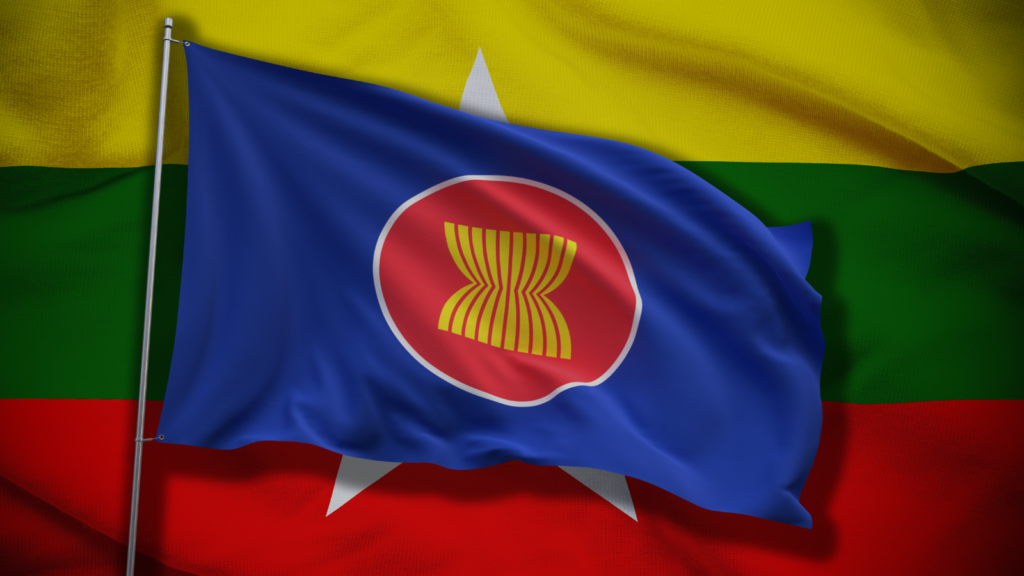A recent survey of regional elite opinion shows a surprising lack of regional concern about the country’s ongoing conflict.
The ISEAS-Yusof Ishak Institute’s annual State of Southeast Asian survey dropped last week, heady times for an overstretched columnist. Not so positive, however, if you’re busy battling a barbarous military junta and are looking around for a bit of moral support from your fellow Southeast Asians.
Let’s turn to page 16 of the survey report. Question 7 asked, “Which of the following current geopolitical events are the top concerns for the government in your country?” As a regional average, only 26.6 percent of the respondents said the crisis in Myanmar was one of the three main concerns, putting it fourth-last, after the 2024 U.S. presidential elections, the implications arising from the 2024 Taiwan elections, and North Korea’s continued ballistic missile testing.
A slight digression. This is bizarre. The three geopolitical issues that Southeast Asian “elites” – four-fifths of the respondents have a bachelor’s degree or higher – think their governments are least concerned about are the threat that a maniac in North Korea will start a nuclear war; the threat that China might invade Taiwan and unleash an Indo-Pacific war; and the threat that Donald Trump will be re-elected president in November and introduce a neo-isolationist policy in Washington that would scupper an international order that has allowed Southeast Asia to go from famine to feast. Granted, the options weren’t spelt out to the respondents in that way, but a right-thinking, educated “elite” has to at least infer some of these potential outcomes.
Anyway, back to Myanmar. As stated, only around a quarter of all Southeast Asian respondents reckon that the Myanmar crisis is a top-three geopolitical concern of their governments. Admittedly, 41 percent of Thais thought it was a top-three concern, although even that seems low considering how much space the Myanmar crisis now occupies in Bangkok’s diplomacy. Just 12 percent of Laotians and less than a fifth of Cambodians thought it was a top-three priority despite their countries suffering some of the negative effects of the conflict, not least the flood of ever-cheaper drugs from Myanmar’s conflict zones.
And if you want to see Southeast Asia’s apparent comradeship at work, then look at the 2.3 percent of Filipinos who reckon the Myanmar crisis is a priority for their government. Moreover, while I do like these State of Southeast Asia surveys, you have to question the caliber of the respondents, when 10 percent of the respondents from Myanmar – which is presumably 18 to 19 of the 190-or-so Burmese respondents – said that the ongoing crisis in Myanmar is not one of the three main concerns of the Myanmar government.
Turn the page to the next question and the respondents are quizzed: “Choose the statement that best reflects your view about ASEAN’s Five-Point Consensus (5PC) on Myanmar.” The options are: “The 5PC is fundamentally flawed in addressing complex issues”; “The 5PC exposes ASEAN disunity”; “The 5PC will not work with the intransigence of the State Administration Council (Junta)”; “The 5PC is the most suitable option under these circumstances”; and “I am neutral about the 5PC.” Granted, the first three options aren’t mutually exclusive. Indeed, the first is a cause of the third. And answers one and three are the causes of number two. Yet there is a range of options for the respondents to pick. So which did most respondents plump for? Answer number five, which might as well have been: “I don’t have an opinion on this matter.” Some 31.1 percent of respondents, as a regional average, said they are neutral on the 5PC – so don’t know, basically.
I’m going to backtrack very slightly because of the next question. But only slightly. Question 9 asked: “To move the Myanmar issue forward, ASEAN should…”, before giving some choices: limit engagement with the junta; “engage in independent dialogue with all key stakeholders, including the National Unity Government [NUG], in Myanmar to build trust”; “mount a coordinated and unified response with international partners”; not interfere; “utilize harder methods…to increase the costs for [the junta] of its non-compliance with the 5PC; or “reinstate SAC’s involvement in ASEAN meetings to continue pushing for 5PC implementation.” It’s heartening that the least favored option was to fully reinstate the junta into ASEAN meetings, although around a tenth of respondents wanted this.
I said I would backtrack slightly because only 12.7 percent of all respondents said ASEAN should not interfere – and that was down from 15.2 percent last year. This, on the surface, would suggest that the Southeast Asian “elite” respondents want some sort of ASEAN response. However, just 14.9 percent wanted ASEAN to take a tougher stance, such as through sanctions, on the junta – and that was down from 2023. Only 13.0 percent wanted ASEAN to take part in an internationally organized response (again, down from the percentage who favored that last year). And only 12.5 percent wanted ASEAN to limit its engagement with the junta even more.
The most favored response (38.6 percent) was for ASEAN to “engage in independent dialogue with all key stakeholders, including the National Unity Government, in Myanmar to build trust.” On the surface, this may sound positive. Of course, ASEAN should engage with the NUG. Of course, ASEAN might be able to respond better if it was trusted. However, maybe it’s just me, but the semantics of the option are so wishy-washy. It says all stakeholders so that includes the junta. It doesn’t actually suggest an end goal. Build trust for what outcome? ASEAN could engage with the junta and the NUG and gain their trust, but then what? Presumably, the bloc would do nothing since, whichever way you look at it, neither side is going to agree to a ceasefire or compromise. You can have all the engagement and all trust in the world, but it’s meaningless unless you’re going to use it to affect some desired outcome, which is absent in this option.
Indeed, this option suggests that ASEAN shouldn’t have a desired outcome. To me, at least, this option is adjacent to the one about not intervening. It sounds nice and meaningful but, in effect, it’s still an appeal for neutrality – and neutrality is non-interference. So I would say that the 38 percent of respondents who wanted engagement with all sides should be added to the 12.7 percent who explicitly said no inference, meaning a majority of the Southeast Asians polled don’t want ASEAN to do anything practical over the Myanmar conflict other than the talk with all sides.
So not only do most of these Southeast Asian “elites” think (accurately) that a deadly war in their own region is not a top priority of their governments and many have no real opinion about the way ASEAN has responded so far, but most of the respondents don’t want their governments or ASEAN to adopt a response that takes sides or could actually influence events on the ground.
The article was originally published by The Diplomat.






